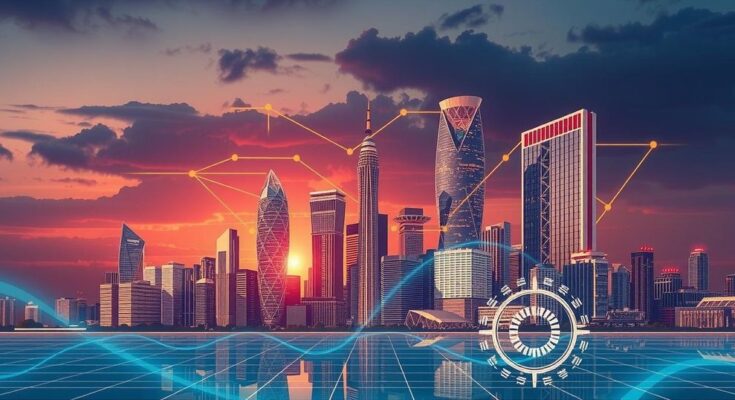The Paris AI Summit will focus on global AI governance, coinciding with rising competition between the U.S. and China’s DeepSeek chatbot. With leaders and executives from 80 countries in attendance, the summit aims to promote ethical AI use while exploring safety and implementation challenges. U.S. interests, led by Vice President Vance, contrast with China’s growing influence, setting the stage for complex discussions on AI policy.
The Paris AI Action Summit, taking place from February 10, 2025, is set to focus on the geopolitics of artificial intelligence. Leaders and tech executives from various nations are gathering to discuss the responsible development of AI amidst rapid advancements, notably highlighted by China’s DeepSeek chatbot. While U.S. Vice President JD Vance participates, China’s special envoy signals significant stakes for AI governance on a global scale.
The summit, co-hosted by French President Emmanuel Macron and Indian Prime Minister Narendra Modi, will address the promise and perils of AI technology. Attendees include European Commission President Ursula von der Leyen, leaders from 80 countries, and key tech executives like Sam Altman of OpenAI. The event will feature discussions, workshops, and keynote speeches aimed at fostering ethical AI.
Amidst concerns over generative AI’s rapid evolution since ChatGPT’s launch, the summit seeks to expand conversations beyond AI safety to embrace a comprehensive range of AI-related topics. Historical agreements from prior summits will inform this dialogue, though no binding regulations are anticipated. President Macron emphasized the need for established rules to govern AI’s future, cautioning against letting the technology become unregulated.
Organizers aim to achieve a political declaration promoting ethical AI development, however, consensus, particularly from the U.S., remains uncertain. A public-private partnership focusing on open-source AI resources is also a significant goal. The initiative aspires to raise €2.5 billion to support trustworthy AI applications and innovations while addressing societal challenges.
In contrast, President Donald Trump has articulated ambitions for the United States to lead in AI, aiming to leverage natural resources for this purpose. His administration intends to craft an AI policy aimed at reducing regulatory obstacles but shows reluctance toward global governance, complicating potential international agreements.
China’s heightened role in AI governance is evident as President Xi Jinping sends a senior representative to the summit, signaling China’s intent to assert its influence in discussions. The recent introduction of DeepSeek, which competes directly with Western AI projects, underscores the mounting tech rivalry between Washington and Beijing.
Transatlantic tensions are likely to escalate, especially with the European Union’s stringent regulations targeting major U.S. tech firms. President Trump has criticized these regulations, viewing them as unfair taxes. Ongoing discussions at the summit reflect the complexities of aligning AI development priorities amid differing national strategies and competitive dynamics.
The Paris AI Action Summit is poised to address critical issues concerning the governance and ethical deployment of artificial intelligence. With advancements in AI technology continuing to accelerate, the event looks to foster international cooperation and set frameworks that ensure safety and benefit for all. In the context of competing national interests, particularly between the U.S. and China, this summit serves as a platform for dialogue among global leaders, tech executives, and policy makers regarding the future of AI technology and its governance.
The Paris AI Action Summit represents a pivotal moment for international cooperation in artificial intelligence governance. Amidst rising competition between the U.S. and China, the discussions seek to balance the promise of AI technology with ethical considerations. While significant challenges remain in creating a unified framework, the commitment to dialogue and partnership is essential for shaping a responsible AI future.
Original Source: apnews.com




